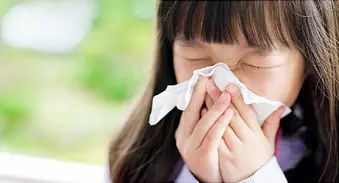What Do You Know About Children's Allergies?


Question 1/11
Which of these is true about hay fever?
- It causes fever
- It causes itchy mouth
- It's often caused by hay
Question 2/11
Allergies are triggered by things called:
- Algernons
- Allergens
- Immunoids
Question 3/11
Allergies can cause:
- Raccoon eyes
- Shin splints
- Chilblains
Question 4/11
When do kids usually outgrow milk and egg allergies?
- By the time they're teens
- As adults
- Kids don't outgrow them
Question 5/11
Pet allergies may be caused by an animal's:
- Hair
- Poop
- Skin flakes
Question 6/11
Which skin condition can be a sign of allergies?
- Eczema
- Roseola
- Shingles
Question 7/11
To lower the odds of your kid getting a nut allergy, they should start eating products with nuts:
- In their teens
- Only after age 3
- Around 4 to 6 months old
Question 8/11
What increases a baby's chances of allergies?
- A parent with allergies
- Cats or dogs in the home
- Both
Question 9/11
Which is a classic symptom of allergies, not colds?
- Hacking cough
- Itchy eyes
- Aches and pains
Question 10/11
Common medicines for allergies are called:
- Antihistamines
- Histamine boosters
- Statins
Question 11/11
If your child has allergies, you might see a:
- Podiatric ichthyologist
- Pediatric immunologist
- Either one